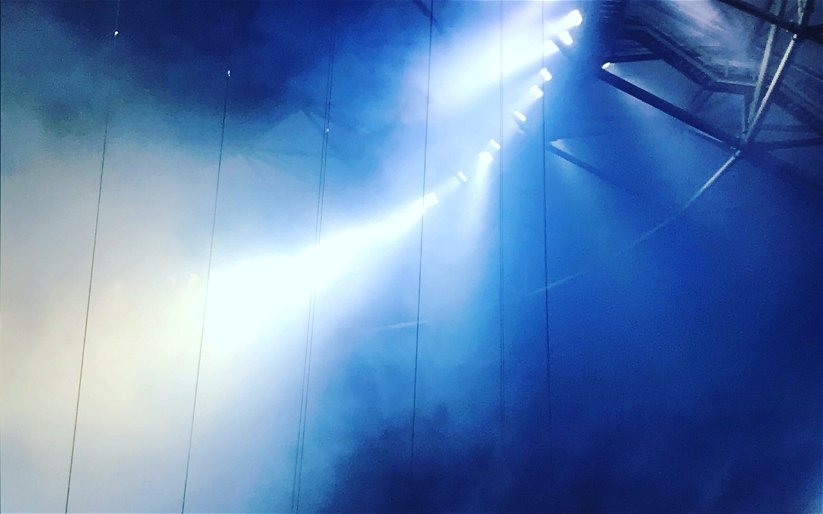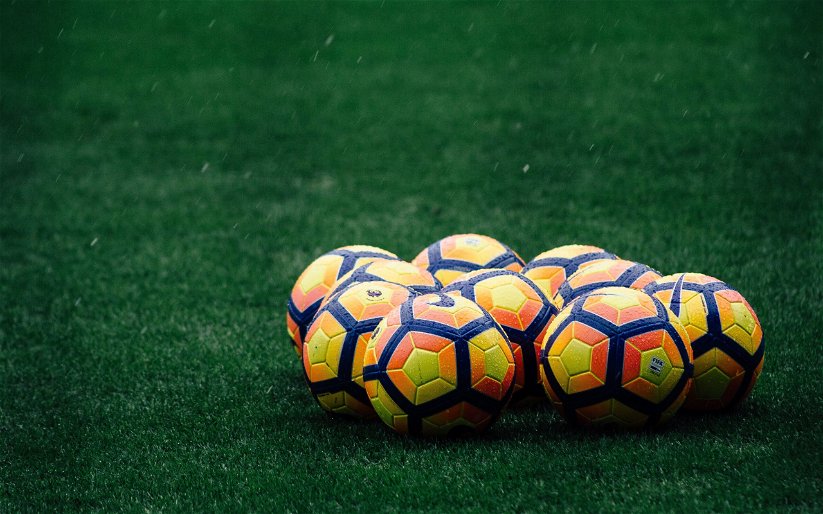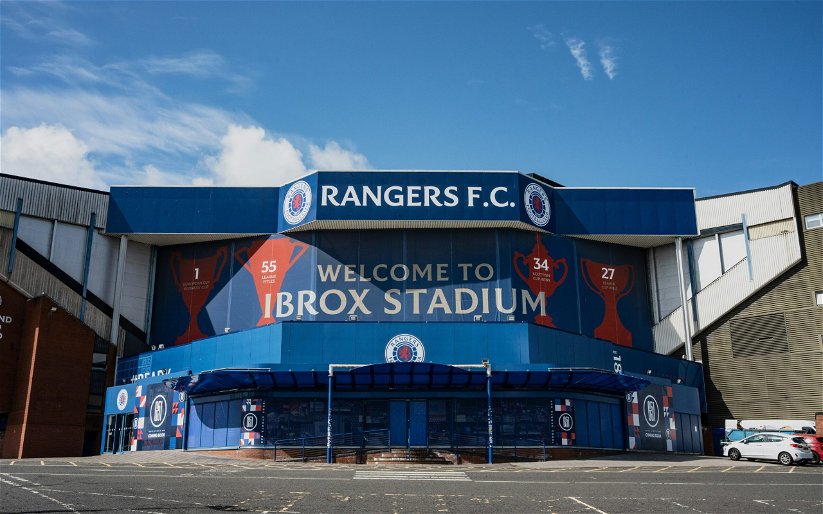By Alistair Aird
In August 1993, Rangers were flying high. In season 1992/93, Walter Smith’s side had won the domestic Treble, gone 44 games unbeaten in all competitions, and come within a single goal of making the inaugural Champions League Final. They had also not tasted defeat at Ibrox since losing 2-0 to Celtic in March 1992. But that was all about to change thanks to a former player who had plied his trade in Govan between 1983 and 1986. His name? Bobby Williamson.
Bobby Williamson was the first player signed by Jock Wallace as he embarked on his second spell as Rangers manager in late 1983. Wallace was reportedly looking for a centre forward, and Nottingham Forest’s Ian Wallace was on his radar. But when he was thwarted in his attempts to sign him, he shelled out £100,000 to persuade Clydebank to sell Williamson to Rangers.
Born on 13 August 1961, Williamson was raised in Easterhouse. The first Rangers game he attended was the Scottish Cup semi-final against Aberdeen at Parkhead in March 1969, but he became disillusioned with football, and it took intervention from a chap called Mr Weir to get him back on the pitch again.
Williamson soon excelled and signed for Clydebank in July 1979, although it would be the back end of season 1981/82 before he got a proper run in the first XI. He played a handful of games at right back and appeared in 11 of the last 13 league games. And in one of them, a 3-3 draw against St Johnstone at Muirton Park, he scored his first senior goal.
The Clydebank manager, Sam Henderson, clearly felt Williamson had an eye for goal, and he would repay Henderson’s faith in season 1982/83. Williamson scored 25 goals in 47 appearances, and included in his haul was a hat trick against Queens Park at Hampden and the opener in a 3-2 defeat against Rangers at Ibrox in the League Cup.
And when Williamson started season 1983/84 in a similar manner – 10 goals in 26 games – Wallace made his move.
Jack Steadman, the Clydebank chairman, informed him that a Scottish club were interested in him. Williamson’s initial thoughts were that it was Motherwell, St Mirren, or Dundee United. United had just taken his strike partner, Tommy Coyne, to Tannadice and there was a rumour going around that Williamson would join him in Dundee. Instead, the interest was from his boyhood heroes.
Wallace had only just come back to the club, and Williamson was his first signing. And his new manager soon stamped his authority. Williamson arrived to be presented to the media sporting a beard he had had for a number of years, but within 24 hours, he was clean-shaven. Wallace was renowned for insisting his players had no beards or moustaches, so the new recruit was told in no uncertain terms to get himself a razor and get rid of his beard before he reported to Ibrox for training!
There were just 427 hardy souls in attendance when Bobby played for Clydebank for the last time. It was 3 December 1983 at Kilbowie, and he scored the last of the 36 goals he netted for his first senior club in a 3-0 win over Meadowbank Thistle. Within a week, he was lining up for Rangers against Motherwell at Fir Park.
Rangers hadn’t made the best of starts to the season. They failed to win their opening four league matches, and despite winning three on the spin thereafter, they proceeded to lose five in a row. In the midst of that run, John Greig resigned, and Wallace returned to the club five years after he had left to join Leicester City.
Wallace’s second spell started with a 0-0 draw at home to Dundee United and that was followed by a narrow 1-0 win against St Johnstone in Perth. And the week before Willaimson made his debut, Rangers faced Hearts at Ibrox and won 3-0.
Williamson didn’t score on his debut – goals from Colin McAdam, Davie Cooper and Dave Mitchell gave Rangers a second successive 3-0 win – but three days later, he netted a hat-trick in a midweek friendly win over Ross County in Dingwall. He scored on his home debut too – the winner against Dundee – but the transition from part-time to full-time was tough initially.
At Clydebank he had been part time, supplementing his income with a career as a bricklayer. When he joined Rangers, he went full time when he signed for Rangers, but after shedding a stone in weight, he maintained his rich vein of scoring form. He grabbed goals at Easter Road and Tynecastle and scored one of the best goals of his career in a friendly match against Feyenoord at Ibrox in January 1984.
The visitors had Johan Cruyff and Ruud Gullit in their team, but Williamson put Rangers in front inside the opening minute of the game. Feyenoord kicked off and the ball was played back to their right back. A hungry Williamson chased him down and as he went to play it inside to their centre back, he nipped in and hit the ball first time into the top corner. The match report penned by Rodger Baillie timed the goal at 18 seconds!
Alas, the KLM Cup went to the Dutch side. Ian Redford put Rangers 2-0 up after 10 minutes before Gullit, Willy Carbo and Cruyff scored to put the Dutch side in front. Robert Prtyz restored parity from the penalty spot. The match ended 3-3, but in the penalty shoot out that followed, Jimmy Nicholl and John MacDonald missed from 12 yards which presented Gullit with the opportunity to win the match for Feyenoord. He did so with aplomb, but the excellent opening goal scored by Williamson remains one of the standout moments from a game graced by some of the greats of the game.
Williamson missed out on the League Cup Final win over Celtic a couple of months later as he was cup-tied but was back in position when the Old Firm clashed in the league at Ibrox in April. And he would make a telling contribution, scoring the only goal of the game in spectacular fashion with an overhead kick.
That goal against Celtic was one of 12 goals Williamson had scored in 23 appearances for Rangers. But the defining moment of his career at Ibrox would come just a few months later during the post-season World Tour.
The tour opened with a match against Australia ‘B’ in Melbourne, and Williamson came on as sub for Bobby Russell. The game ended 0-0, and afterwards, Wallace allowed his players to go out for a few beers. But for Williamson, the night would end in Southport Queensland Hospital with his right leg encased in plaster.
Williamson ended up staying there nursing a broken leg for five weeks. And when he eventually got home, he embarked on a long road to recovery. He wouldn’t kick a ball in earnest for Rangers until he was selected to face Dumbarton Reserves at Ibrox in late December 1984.
Although he was fit again and available for selection, the sum total of Willamson’s first XI action in season 1984/85 was one appearance as sub in the league and four friendly matches. The comeback from the leg break hadn’t gone to plan, but after experiencing pre-season Wallace-style in the summer of 1985, Williamson was out to stake a claim for one of the striking positions.
Bobby must have caught big Jock’s eye as he started 10 of the first 11 league games and scored four times, including a late winner at his old stomping ground, Kilbowie. He grabbed a glut of goals in the League Cup too, netting a hat trick against Clyde, a double against Hamilton Accies and a crucial goal in a 2-2 draw against Forfar Athletic.
Rangers made an excellent start to the season – they chalked up five wins and a draw in their opening six league games – but it was a false dawn. Wallace’s side lost back-to-back home games against Dundee and Aberdeen towards the end of September, and sandwiched between those two league fixtures was a 2-0 defeat at Easter Road in the League Cup semi-final.
It was a calamitous time, and it was inevitable that there would be casualties. Bobby was one of them. After Rangers were thumped 3-0 at Tynecastle in mid-November, Williamson, who hadn’t registered a goal since September, was dropped to the reserves.
In the five league games he missed, Rangers won one, drew two and lost two. The season was spiralling into the abyss, so Wallace brought Bobby back in for the Ne’erday game at Parkhead. Rangers lost 2-0 at Parkhead, and Williamson was also selected for the 3-2 defeat against Hearts at Tynecastle in the Scottish Cup that effectively ended the season for Rangers. But after starting in the 1-0 defeat against Aberdeen at Pittodrie in February, Bobby Williamson would only make a further five appearances for the Rangers first team. In the last of them – a 3-1 win against Falkirk at Brockville in a pre-season friendly in July 1986 – he scored two goals.
By then, Graeme Souness had taken over as player-manager, and although Williamson made the squad for the pre-season trip to West Germany and played in a couple of the games, he got a call one day to tell him that West Bromwich Albion were looking for a striker. After three seasons, 71 appearances and 27 goals, Williamson left Rangers as part of a swap deal that brought Jimmy Nicholl back to Ibrox.
Williamson scored 12 goals in 45 appearances for WBA before he signed for Rotherham United in July 1988. He established himself as something of a cult hero with The Millers, scoring 27 goals in 42 league appearances in season 1988/89 as Rotherham were crowned champions of the old Fourth Division (now League Two). But in November 1990, Williamson came back north of the border when he signed for Kilmarnock.
Lining up in the same team as his former Rangers teammate, David Mackinnon, Bobby scored 14 goals in 23 league appearances as Kilmarnock finished fifth in the First Division in season 1990/91. And when the Ayrshire side gained promotion to the Premier League in season 1992/93, Williamson netted six times. But it was a goal on his return to Ibrox that he is arguably best remembered as a Kilmarnock player.
Rangers hadn’t tasted defeat in a league match at Ibrox since March 1992, a run of 26 games that comprised 23 wins and three draws. But newly-promoted Kilmarnock brought that run to a shuddering halt, and it was Williamson who delivered the telling blow.
Seventeen-year-old Mark Roberts dived in to head a Shaun McSkimming cross beyond Ally Maxwell after 61 minutes, but Steven Pressley equalised with a header from an Ian Durrant cross 11 minutes later. But as Rangers pushed for the winning goal, they were caught cold.
Pressley tried to usher the ball out of play but was dispossessed by Tom Brown. His cutback was lashed towards goal by Ian Porteous, and although Maxwell made the save, he parried the ball into the path of Williamson who had a gaping goal to aim. He rolled the ball into the net with his left foot and took the acclaim of the Kilmarnock fans housed in the Broomloan Road Stand.
The result wasn’t too detrimental to Rangers. It was one of four defeats suffered at ‘fortress’ Ibrox, but they still won a sixth successive title, finishing three points clear of runners-up Aberdeen. Meanwhile, Bobby’s Kilmarnock finished eighth with 40 points, surviving on goal difference as the top flight transitioned from 12 teams to 10. They would beat Rangers again before the season ended too, winning 1-0 at Rugby Park in the penultimate game.
Williamson’s last full season as a player was 1994/95, and after a spell coaching the youth team at Kilmarnock, he took over as manager when Alex Totten was dismissed in November 1996.
Williamson’s first match in charge ended in a 2-0 home defeat against Dundee United. But in the run of games that followed were wins over Hearts (2-0) and Aberdeen (3-0) and a draw at home against Rangers. And despite suffering a 6-0 thrashing at Parkhead, both sides of the Old Firm were beaten in the closing stages of the season as Bobby’s side finished a point clear of the relegation play-off spot.
But it was in the Scottish Cup that Williamson enjoyed his finest hour as Kilmarnock manager.
Wins over East Stirlingshire (2-0), Clyde (1-0) and Morton (5-2) took Kilmarnock through to face Dundee United at Easter Road in the semi-finals. The first match ended in a no-score draw, but a late goal from Jim McIntyre edged United out in the replay and took Kilmarnock through to face Falkirk in the final at Ibrox.
The match would pitch Williamson against his predecessor as Kilmarnock manager, Alex Totten. Totten was also assistant manager at Rangers when Williamson had played there, and there was a Rangers connection in the respective starting XI’s too, with former players Gus McPherson and David Hagen selected for Kilmarnock and Falkirk.
In front of a crowd of 48,953, a goal from Paul Wright saw Kilmarnock secure the Cup for only the third time in their history. Their last success had come in season 1928/29 when they defeated holders Rangers 2-0 at Hampden.
It was a remarkable achievement, and victory meant that Kilmarnock would play European football in season 1997/98. But, under the astute guidance of Williamson, it would also be a platform from which the plucky Ayrshire side would joust with the giants at the top end of the table rather than scrap for survival at the bottom.
In season 1998/99, Williamson brought two of his former Rangers team-mates, Ally McCoist and Ian Durrant, to Rugby Park, and both excelled enough to be capped for Scotland during their respective stints in blue and white stripes. McCoist also scored a memorable hat trick against Hearts early in his Kilmarnock career.
Williamson took his side to another national cup final in 2001 – they lost 3-0 to Celtic in the League Cup – but he left Kilmarnock in February 2002 to take over as manager of Hibernian. And during his tenure at Easter Road, he led them to the League Cup Final in 2004.
Bobby joined Plymouth shortly after that and had a spell in charge of Chester City before becoming manager of the national team of Uganda in August 2008. He then led Gor Mahia to their first national league title in Kenya in 18 years before concluding his managerial career with a couple of years in charge of the Kenyan national team.
Williamson, who successfully fought against cancer of the nasal passages, still lives in Kenya today. Inducted into the Kilmarnock Hall of Fame in 2018, his place in the folklore of the club is secure thanks to that Scottish Cup success in 1997.
As for his time with Rangers, not many players can lay claim to having scored a winning goal in an Old Firm match with an overhead kick or scored a beauty while sharing a pitch with luminaries like Gullit and Cruyff. But the leg break sustained in the summer of 1984 will always leave us with the question of what might have been.
Bobby’s goalscoring return between December 1983 and May 1984 – a ratio of a goal every two games – was excellent and had injury not intervened, the brickie from Easterhouse may well have gone and established himself as a household name.
Instead, his return to fitness coincided with a certain Ally McCoist finding the scoring touch that had for the most part deserted him since he had joined Rangers. And although he had that fine start to season 1985/86, he was one of many who had to seek pastures new when Graeme Souness arrived.
Although his achievements as a manager perhaps dwarf those he had as a player, Bobby Williamson will always be remembered fondly by those who saw him ply his trade at Ibrox in that turbulent pre-Souness period He was a victim of circumstance, but he still managed to live out the dream that so many of us have; he played for the club he loved.




